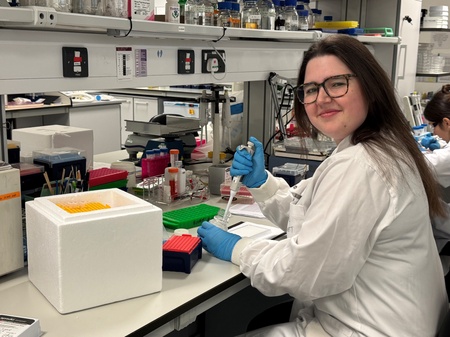To celebrate International Women’s Day, we spoke to fourth year Biomedical Science student Caitlin Gillespie about her interest in women’s health, and her research into belly fat and weight increases during the menopause.
Hi Caitlin, what can you tell us about the work you're doing?
A common feature of menopause is weight gain, and in particular gaining belly fat. I’m doing a research project at the Rowett Institute – one of the leading research centres in the world for nutrition and health – to study this. Specifically, over the last month I have been investigating why menopause causes a shift from the ‘healthier’ hip fat to the more ‘harmful’ belly fat (that surrounds internal organs). This work is important because the change in the distribution of fat increases the chances of developing conditions such as cardiovascular disease and insulin resistance. I hope that by advancing this field, scientists can understand how and why this happens and hopefully identify ways in which we can prevent it.
To achieve this, I am learning how to do different research techniques. One is called RT-qPCR - this helps me identify which genes are changing within different deposits of fat cells, do they increase after menopause/with ageing or do they decrease? I am also hoping to use a research method called histology - to help understand what is happening to the fat cells and see whether they change shape, size or number. I will compare my results to males of the same ages to see whether any differences that I find are specifically related to being female. The work I am doing just scratches the surface of a much wider topic and I hope that more studies will take this work further to help better our understanding of changes in fat distribution related to menopause.
What degree are you working towards at the University of Aberdeen?
I am currently in my final year of my BSc in biomedical science with a focus on physiology. I am so sad that it is nearly over as I have loved every minute of it, from the amazing lecturers to the hands-on tutorials in the new Science Teaching Hub, I have gained so much from this degree.
How does this degree help prepare you for your next steps when you graduate?
This degree has helped me to develop my critical thinking skills, improve my confidence and learn how to approach a problem or obstacle in a manageable way. I hope to carry these skills into my next degree and further improve on them as I start a degree in Medicine in September. I feel that the skills and learning techniques that I have developed will set me at a huge advantage in both my medical degree and in my future work as a doctor.
What would you say to students thinking about applying to university to do a medical or scientific degree?
Just go for it! The biggest thing that I have learned when applying for opportunities whether that be degrees or scholarships is your own confidence can often be your biggest barrier, the worst thing that they can say is no but even then, keep at it, keep on trying, you may even surprise yourself when you find out how capable you are!


